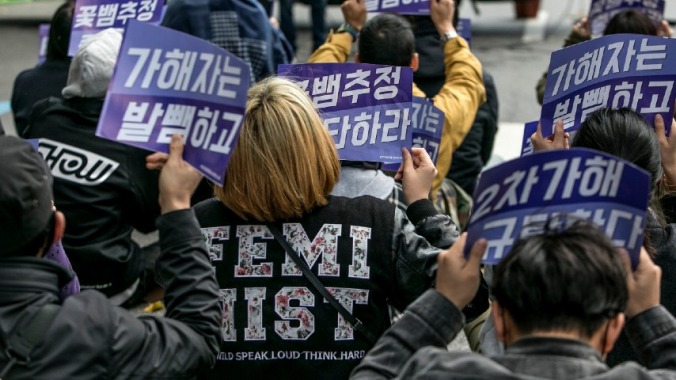Everything to Know About the 4B Movement (Because We Know You’re Searching It)
The majority of white women voted for a political future that will further disenfranchise women. But for those who didn't, if South Korea's 4B Movement provides them with some autonomy in their personal lives, then "go off," as they say.
Photo: Getty Images In Depth
In the week since Trump’s election victory, between the numbness and overall dread, maybe you’ve heard or read the phrase “4B movement” and thought, Movement of any kind feels difficult at the moment. Hey, no judgment, that was many of us last week. But now that some of the immediate panic has settled into a more concrete and permanent apprehension, you hopefully have the capacity to learn more about the phrase and why it’s being thrown around so much.
First of all, you wouldn’t be alone in your curiosity. Searches for the “4b movement,” which originated in South Korea in 2016, spiked nearly 100% in the last seven days. Social media is ablaze with users explaining it, decrying it, or suggesting the U.S. get on board with it. “Women are refusing to have kids until they’re treated equally,” Drew Afualo explained on Rainn Wilson’s podcast. That is certainly part of the movement. In general, the nature of online discourse and the reactionary buzz following Trump’s re-election has simplified the 4B movement into merely being a sex strike—which in turn has allowed it to become more of a punchline. But I think the question to grapple with isn’t how effective a U.S. 4B movement would or wouldn’t be, but why some women feel it’s a worthwhile endeavor at all.
But let me back up…The 4B movement is a South Korean feminist movement that centers around four main tenets: “Bihon” (no heterosexual marriage), “Bichulsan” (no childbirth), “Biyeonae” (no dating), and “Bisekseu” (no heterosexual sexual relationships). It began to emerge around 2018 when gender tensions reached a fever pitch after years of a growing cultural demonization of feminism. In 2014, Ilbe, an online alt-right, misogynistic community began to grow more and more popular among young men. In 2016, a young woman was murdered in a public bathroom in Seoul by a young man who was angry that women kept ignoring him. (Despite his alarming reasoning, police did not label the murder a hate crime.) That same year, triggered by the low birth rate, the government released a “National Birth Map,” which showed where all the women of reproductive age lived. (Women, understandably, were furious to be labeled like livestock.) In 2018, another movement emerged called “escape the corset,” which rejected the laborious beauty efforts expected of Korean women.
It’s a safe bet that when women make decisions with only themselves—be it their safety, their economic power, or their bodies—in mind, people will get very, very angry.
The backlash to and convergence of these moments galvanized a large group of women to really reckon with Korea’s societal expectations of them, and the 4b Movement was born. Now, some women living in Korea’s exceptionally patriarchal society (the wage gap is one of the widest in the world, and gender-based and domestic violence is increasingly common) have adopted the practices along with shaving their heads, opting out of wearing makeup, sharing economic advice, or choosing to live domestically with other women. It isn’t exactly clear how many women actively participate, but in 2019, the group claimed to have around 4,000 members.
-

-

-

-

-

-

-

-

-

-

-

-

-

-

-

-

-

-

-

-

-

-

-

-

-

-

-

-

-

-

-

-

-

-

-

-

-

-

-

-








































